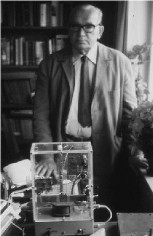 I’ve got an article in The Observer about our tendency to perceive meaning where there is none and how this inadvertently popped up in one of the strangest episodes in the history of psychology.
I’ve got an article in The Observer about our tendency to perceive meaning where there is none and how this inadvertently popped up in one of the strangest episodes in the history of psychology.
The article discuss the work of psychologist Konstantīns Raudive who began to believe that he could hear the voices of the dead amid the hiss of radio static – after, it must be said, much re-recording and amplification of the samples.
He wrote a 1971 book called Breakthrough where he explained his technique which was even accompanied by a flexidisc that has lots of not very convincing examples of the dead speaking through noise. You can listen to it on YouTube if you’re so inclined.
He gained widespread media attention but subsequent scientific studies found that everyone was hearing something different amid the static, making it one of the most well-know examples of illusory meaning or pareidolia of its time.
However, the experience of illusory meaning has become widely studied for its relationship to magical thinking and hallucination but was even recently deployed as a practical tool for the assessment of dementia.
More in the full article at the link below. It’s been given a somewhat odd title but hopefully, it should be fairly self-explanatory.
Link to Observer article on illusory meaning.
ome of the comments on your article are fairly depressing. that aside, a great read. i loved bruce hood’s Supersense.